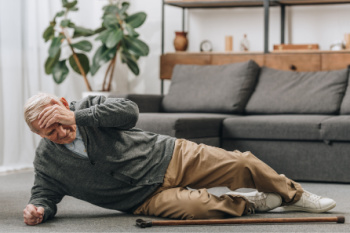
Falls are a significant concern for older adults, as they can lead to serious injuries and a decline in overall health. Several risk factors contribute to falls in this age group, including a fear of falling, which can limit mobility and lead to a decline in physical activity. Loss of strength and balance also increases the risk of falling, as muscles weaken with age. Poor vision, medications that cause dizziness, and environmental hazards such as slippery floors or poor lighting further elevate the risk. To prevent falls, older adults should engage in strength and balance exercises to maintain mobility and flexibility. Wearing proper footwear with a good grip can also help prevent slips. Removing hazards from the home, such as rugs or clutter, and installing grab bars in key areas can make the living environment safer. Regular eye exams and medication reviews are also important in reducing fall risks. If you have sustained a foot injury from falling, it is suggested that you consult a podiatrist who can offer you effective relief and treatment solutions, and guide you on successful fall prevention tips.
Preventing falls among the elderly is very important. If you are older and have fallen or fear that you are prone to falling, consult with one of our podiatrists from Summit Podiatry. Our doctors will assess your condition and provide you with quality advice and care.
Every 11 seconds, an elderly American is being treated in an emergency room for a fall related injury. Falls are the leading cause of head and hip injuries for those 65 and older. Due to decreases in strength, balance, senses, and lack of awareness, elderly persons are very susceptible to falling. Thankfully, there are a number of things older persons can do to prevent falls.
How to Prevent Falls
Some effective methods that older persons can do to prevent falls include:
- Enrolling in strength and balance exercise program to increase balance and strength
- Periodically having your sight and hearing checked
- Discuss any medications you have with a doctor to see if it increases the risk of falling
- Clearing the house of falling hazards and installing devices like grab bars and railings
- Utilizing a walker or cane
- Wearing shoes that provide good support and cushioning
- Talking to family members about falling and increasing awareness
Falling can be a traumatic and embarrassing experience for elderly persons; this can make them less willing to leave the house, and less willing to talk to someone about their fears of falling. Doing such things, however, will increase the likelihood of tripping or losing one’s balance. Knowing the causes of falling and how to prevent them is the best way to mitigate the risk of serious injury.
If you have any questions, please feel free to contact one of our offices located in Wilmington, Whiteville, and Wallace, NC . We offer the newest diagnostic and treatment technologies for all your foot care needs.
